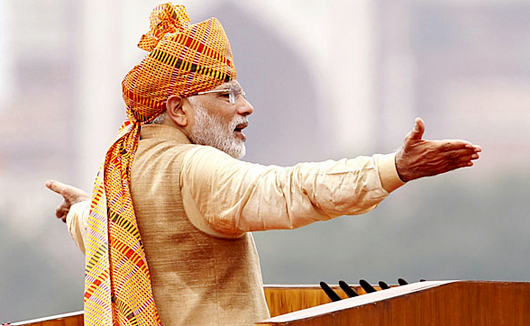New Delhi, Aug 15: Prime Minister Narendra Modi today announced a new campaign 'Start-up India; Stand up India' to promote bank financing for start-ups and offer incentives to boost entrepreneurship and job creation.

He also promised to do away with the current practice of interview-based selections for low-skilled government jobs. The Prime Minister announced the 'Start-Up India' initiative, which would encourage entrepreneurship among the youth of India.
From the Red Fort, he said each of the 1.25 lakh bank branches should encourage at least one Dalit or Adivasi entrepreneur and at least one woman entrepreneur.
"We are looking at systems for enabling start-ups. We must be number one in start-ups... Start-up India; Stand up India," he said, exhorting all bank branches to fund at least one start-up of tribals and dalits.
The initiative, Modi said, would give a new dimension to entrepreneurship and help in setting up a network of start-ups in the country. As part of the Skill India and Digital India initiative, the Prime Minister said a package of incentives will be given to manufacturing units for generating jobs.
Modi also questioned the practice of "interviews" for recruitments even at relatively junior levels and asked departments concerned to end this practice at the earliest and promote merit by recruiting only through transparent, online processes.
The Prime Minister reiterated his government's resolve to make India a developed nation by 2022, with a house and access to basic services like electricity to all. Talking about the financial inclusive programme Jan Dhan, he said 17 crore bank accounts were opened. Although these were to be zero-balance accounts, people deposited a whopping Rs 20,000 crore in them, reflecting the "richness of India's poor", he added.
The Prime Minister also spoke of the welfare schemes launched by the his government, including Atal Pension Yojana, Pradhan Mantri Suraksha Yojana, Pradhan Mantri Jeevan Jyoti Yojana, and the schemes launched for labour welfare.
He said 10 crore people have enrolled for social security schemes in a mere 100 days.
He said the government has resolved to provide electricity to all the 18,500 villages which still remain without power within the next 1,000 days. He also reiterated his vision for the development of eastern India.





Comments
Add new comment